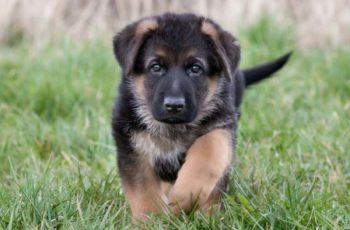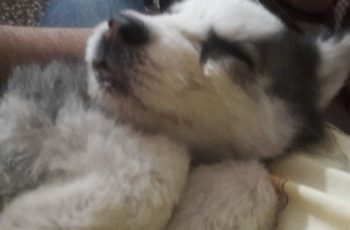This post may contain affiliate links. We may earn money or products from the companies mentioned in this post.
So you want a Great Dane?
These giant pups are elegant, loyal and (mostly) sweet dogs who are sure to make you stand out wherever you show up with them.
SPOILER ALERT: If you’re more of an introvert and don’t care about being in the limelight, a Great Dane may not be the right choice of dog for you! Yep, these “Gentle Giants” will make you stick out like a sore thumb.

But beyond that, do you have what it takes to handle and afford a Great Dane and share your life with them?
Check out this blog post to learn all about the Great Dane, including the good, the bad and the ugly.
1. Great Danes Aren’t From Denmark But From…
…Germany!
What!? Great Danes aren’t Danish? Yep!
Similar to Weimaraners and German Shorthaired Pointers, Great Danes are courageous dogs who were originally used by German aristocracy to hunt wild boars and protect their noble premises as of the 17th century.
This background means they’re representatives of the American Kennel Club’s (AKC) Working Group.
Like most dog breeds that fall into this category, Great Danes need a decent amount of physical and mental exercise to thrive and stay out of trouble.
2. Great Danes Used To Be Circus Dogs
Yes, they used to work for the Circus, but maybe not in the way you think. Great Danes didn’t perform tricks the way lions did or carry humans the way horses did.
They were used for protection. As you can imagine, training lions, tigers, and bears (oh my!) is a dangerous business.
Circus ringmasters were putting themselves in harm’s way every day attempting to tame these beasts. So what would happen if the training took a turn for the worst?
Enter the Great Dane.
Many circus trainers had a Great Dane by their side at all times while training lions and tigers.
If the big cat decided to lash out, the Great Dane would react immediately, attacking the cat in defense of its master.
This gave the lion tamer a few moments to run to safety – even if it meant harm for the dog.It takes a certain type of dog to attack a lion or tiger on behalf of their master.
The Great Dane Club of America notes that Great Danes have always been bred for three major traits: loyalty, spirit, and courage.
These qualities make Great Danes fierce protectors of those they love – in the circus and daily life.
3. They Have A Deep Bark
Today’s Great Danes are as courageous as their wild boar hunting forefathers, which means they’re great home protectors.
Besides their massive presence, their deep bark is better than any alarm system.
One of my former pet sitting clients had 3 Great Danes whose barks filled their home and echoed across the entire neighborhood whenever they were outside in their yard!

4. They’re Giant Snuggle Bugs With People They Love
All 3 loved cuddles, especially Shaun. He always wanted to be close to me when I watched them, and loved getting kisses on his neck.
Speaking of giant snuggle bugs, you’ll need extra large beds for your Great Dane(s). An actual Queen size bed will do too (but a King size would be better)!
While they’re great with kids and families, they tend to be aloof with strangers and will need to be socialized to other dogs and animals from an early age on.
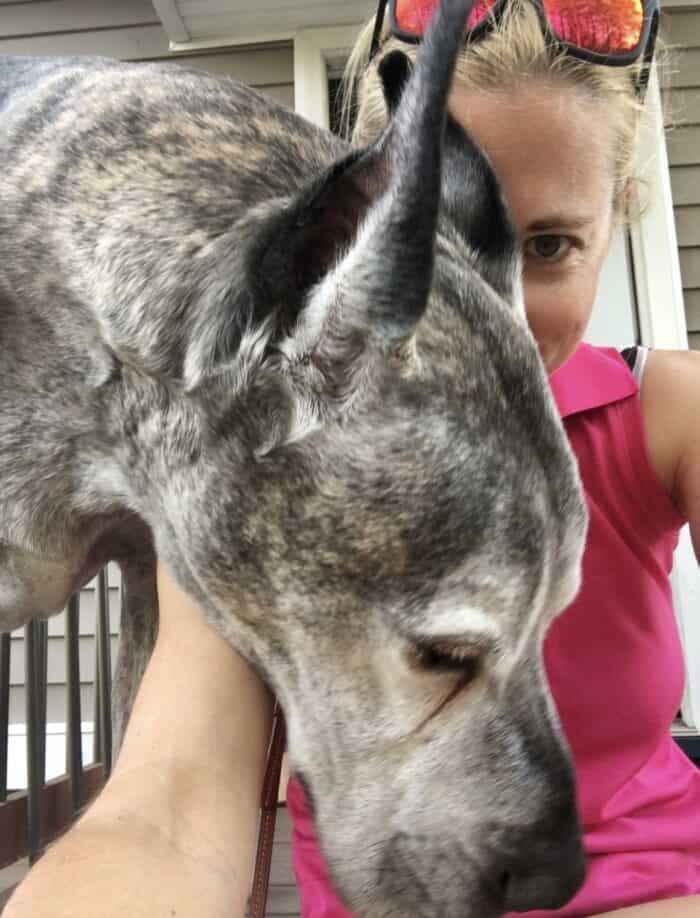
5. Great Danes Are Prone to Counter Surfing
This one’s kind of a no-brainer – fully grown Great Danes can easily reach your kitchen counters and dining room tables.
That’s why it’s best not to leave anything tempting out within their reach.
You can also restrict your Great Dane’s access to the kitchen with dog gates. Just make sure that you use an extra tall one or to mount a regular sized dog gate at a distance from the floor.
That’s to keep your giant pup from simply jumping it!
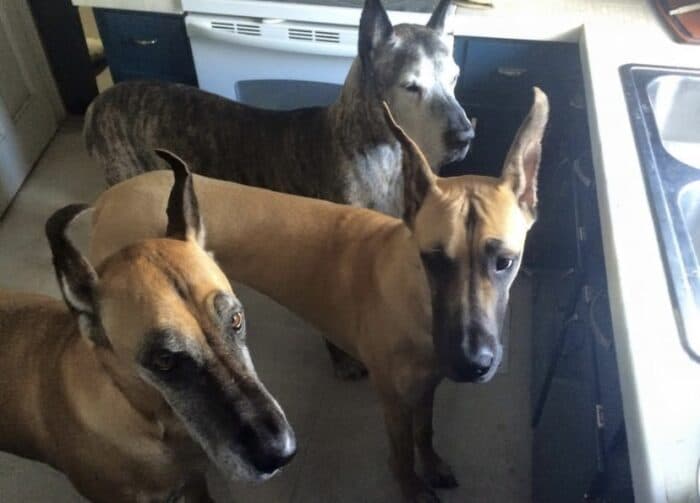
6. Life Expectancy 6-10 Years
One of the major downsides of owning a Great Dane is their short life expectancy.
Similar to other extra large breeds like Mastiffs or Irish Wolfhounds, they rarely live to be older than 10 years.
Of course the death of a beloved dog is always tough, but having to say goodbye after less than a decade is particularly heart breaking.
7. Call Them the “Gentle Giants”
There’s no doubt about it: Great Danes are huge. The AKC puts their maximum height at 32 inches at the shoulder.
And when a Great Dane stands on its hind legs, it will be taller than most humans!
“A Great Dane must be spirited, courageous, never timid; always friendly and dependable,” is a quote from the AKC breed standard.
A Great Dane is bred to be loyal and trustworthy with their human companions. In fact, they are known for being excellent with children of all ages.
Though they are prone to gentleness, that doesn’t mean a Great Dane owner should forgo proper training.
A poorly trained Dane could result in some serious mishaps due to their size. Supervision around children is also essential.
Due to their sweet nature, positive reinforcement training should always be used. And be sure to start training early while your Great Dane is still small enough to be easily controlled!
8. Because Of Their Large Size They Can Be Expensive Dogs
Great Danes aren’t quite as heavy as Mastiffs who can weigh up to 230 lbs.
However, male Great Danes weigh between 140-175 lbs, and female Danes weigh somewhere between 110-140 lbs.
Keeping those numbers in mind, you can probably guess that Great Danes need a lot of food to fuel their giant bodies.
So be prepared to add a few hundred dollars for quality dry, homemade or raw dog food to your monthly grocery bill!
9. They Make Excellent Therapy Dogs
It’s no surprise that with such a great disposition, these sweethearts make fantastic therapy dogs.
To be a successful therapy dog, the canine in question must first be disposed to such traits as patience, sweetness, and friendliness – all of which the Great Dane possesses.
Many therapy dogs work on a volunteer basis, traveling to different locations with their owner.
These dogs all must be certified to work closely with people of all types and in all situations.
Therapy dogs must be comfortable around children, the elderly, and also around certain medical equipment.
An owner and dog team can volunteer through a variety of organizations such as Therapy Dogs International or Pet Partners.
The GDCA has a collection of photos of Great Danes doing therapy work in many different capacities. Too cute!
10. They Also Make Great Service Dogs
Service Dog Project breeds, trains, and donates certified service dogs to people who experience difficulty with their balance or mobility.
Service Dog Project has trained and donated over 200 certified Great Dane service dogs to individuals who have difficulty with their balance and mobility.
An amazing organization! An amazing breed!
Check out some of some pics of Great Danes in training.
11. Common Health Issues In Great Danes
As you’ll see in this section, Great Danes can be affected by various ailments.
That’s why you’ll want to make sure you have medical insurance in place as soon as you bring your Great Dane puppy home with you.
A well cushioned savings account for potential Great Dane vet expenses will do, too!
Bloat
Unfortunately, 40% of Great Danes suffer from Bloat, also known as GDV or Gastric Dilatation Volvulus.
Bloat happens when the stomach turns and twists on itself, thus shutting off the blood supply to vital organs.
Since Bloat is the number one cause of death in Great Danes, there’s a surgical preventative that’s called Prophylactic Gastropexy where the stomach is tacked to the body wall.
Although it sounds like a giant procedure, it’s not and is often performed with spay or neuter procedures.
Another way to prevent Great Danes from bloating is to keep them from drinking large amounts of water at once and not exercising them immediately before and after mealtime.
Ideally, you’ll want to keep an hour buffer between exercising and feeding your Great Dane.
One more tip: Elevated dog feeders are said to contribute to bloat, so you’ll likely be better off with regular dog bowls that sit on the floor.
Hip Dysplasia
Like other giant dog breeds, Great Danes are often diagnosed with hip dysplasia, an inherited disease that causes the hip joints to form improperly.
Symptoms are weak hindlegs and stiff limbs due to inflamed, painful joints.
One approach to keeping Hip Dysplasia at bay is for breeders to test the parent dogs for the disease and not to breed dogs who test positive for it.
Another one is for Great Dane owners to keep their Great Danes at a healthy weight to prevent excessive stress on their joints.
Autoimmune Thyroiditis
Great Danes are also prone to suffering from Autoimmune Thyroiditis, which causes Hypothyroidism.
Just like Hip Dysplasia, it’s an inherited disease.
That’s why responsible Great Dane breeders test the dogs they intend to breed for it. If detected, they won’t breed them.
DCM
DCM, or dilated cardiomyopathy, is also an inherited (heart) disease.
It causes a disruption in their heartbeat, chamber dilation and ultimately heart failure.
Again, Great Dane breeders who care about the health of their Great Dane puppies will test for this disease prior to breeding the parent dogs.
12. Wait To Run Your Great Dane Puppy Excessively
In order to avoid damaging your puppy’s growing joints, you’ll want to wait until your Great Dane is 2 years old before you run them excessively.
But once they hit that age, they make great running buddies!
The same applies for jumping tall obstacles such as during an agility course.
That’s not to say that Great Danes can’t start agility training until they’re 2 years old.
But they should start slowly and shouldn’t be asked to clear super tall obstacles.
If you’re unsure of the type of exercise you can expose your Great Dane pup(py) to during their growth phase, check in with your breeder and/or vet.
13. Their Short Coats Are Easy To Care For
Great Danes do fine with a few weekly brushings. All you need is a Grooming Glove or Mitt.
But when there’s several Great Danes in your home as was the case with my former 3 Dane clients, you’re still going to be covered in fur!
As far as bath time is concerned, you may have to wash them outside in your yard or take them to a doggie self wash – depending on the size of your tub or walk-in-shower.
14. Your Great Dane Puppy Benefits From Polite Leash Training Sessions Early On
Obviously, any dog does well with proper leash training, but you’re particularly going to appreciate polite leash walking skills in giant breeds like the Great Dane.
After all, they’re a strong breed that can take YOU for a walk instead of the other way around.
To start, get your Great Dane puppy used to the feeling of a collar/leash combination during their most impressionable stage, between 8-16 weeks old.
You can start in the comfort of your home and then graduate to leash training in your yard (if you have one) or patio.
The first goal is to get your pup used to the leash as a connection between themselves and you, their handler.
The second goal is to walk with a loose leash without any tension.
In order to achieve this, it really helps to change direction frequently and to walk imaginary figure 8s. That teaches your pup to pay attention to you and to follow where you lead them.
It also helps to reward your puppy with verbal praise (“Good boy!”) and/or training treats as they follow you.
For super quick treat access, consider using a dog treat pouch. Alternatively, you can also carry some in your pockets, but the treat pouch is less messy.
15. The Only Dog Ever Enlisted in the Royal Navy was a Great Dane
The Great Dane Just Nuisance was born in April of 1937 near Cape Town, South Africa. When he was just a puppy, he was purchased by a man named Benjamin Chaney.
Chaney soon moved to Simon’s Town where he was to run the United Services Institute. In those days, the USI was full of Royal Navy Sailors at the Simon’s Town Naval Base. Just Nuisance’s destiny was set in motion.
The Navy Sailors adored him. They loved to spoil the Great Dane with pies, treats, and even beer (not recommended for your Dane) He, in turn, adored all the sailors and took to following them around.
Often the dog could be found laying on the deck of a ship, completely in the way. Sailors would tell him he was “just a nuisance” and thus his name was created.
Just Nuisance also liked to follow the sailors when they traveled via train. The sailors loved it and attempted to hide him on the trains, smuggling him onboard without a ticket.
Of course, since he was a Great Dane, this didn’t work so well. When a conductor would come by to protest the dog’s presence, Just Nuisance would jump to his hind legs, put his front paws on the conductor’s shoulders, and growl in his face.
This wasn’t going to work for long, so the Commander in Chief came up with a solution. Enlist the dog into the Navy!
His enlistment as a volunteer would allow him to ride the trains for free. Just Nuisance went through a medical examination just like a Navy Sailor and even signed the proper forms with his paw print.
Though he never went to sea, Just Nuisance was always there to boost morale for the sailors.
They even held a wedding for him to a Great Dane named Adinda. The marriage resulted in five puppies.
Just Nuisance was put down at the age of 7, after surviving a car accident that was slowly paralyzing him.
His legacy lives on in the form of a statue that stands in Simon’s Town today.
16. Great Danes Also Make Excellent Cartoons
Some of the most beloved Great Danes the world has ever seen aren’t even real – they are cartoons!
Marmaduke
In 1954, Brad Anderson published the newspaper comic strip “Marmaduke.”
The comic followed a Great Dane named Marmaduke and all the trouble he would get himself into.
The charm of Marmaduke came from the fact that he was a dog behaving like a dog, not a person.
The inspiration was drawn from Anderson’s pet Great Dane. In 2010, a live-action film version of the comic strip was released.
Though it was not well received, the Great Dane who plays Marmaduke is certainly adorable!
Astro
In 1962 the world was introduced to the Jetson family and their dog Astro. The Jetsons was a hit, and after success in the ’60s made a comeback in the 1980s.
Astro was a Great Dane who could talk to his family – though he replaced many of his consonants with the letter “R” (ruh-roh, Reorge!).
Scooby Doo
Probably the first famous Great Dane people think of, Scooby Doo has become an icon.
It all began with the hit TV series in 1969, and has since inspired spin-off shows, cartoon movies, live action movies, and even video games!
Scooby-Doo and his best friend Shaggy are a dynamic duo. Scooby talks similarly to Astro, saying “Ruh-roh, Raggy!” any time they find a ghost!
Bottom Line
So, do you still want a Great Dane?
While Great Danes make great family dogs, they’re not necessarily the best breed for first time dog owners.
Remember, everything is big about the Great Dane, from their stature and body weight to their health expenses and lifestyle costs.
However, you may be able to save on your alarm system costs!
But still, overall you’ll need somewhat deep pockets and at least basic knowledge about how to properly socialize and train (big breed) puppies.
While your socialization strategy should include working on polite leash walking skills, you’ll also have to introduce your giant puppy to other dogs and animals in general.
Also, remember to take it slow as far as running and jumping your Great Dane puppy to avoid putting too much stress on your their growing joints.
Now it’s your turn, are you the proud owner of a Great Dane?
Or are you thinking about bringing a Great Dane puppy home with you?
Either way, we’d love to hear from you in our comment section!
Save To Pinterest
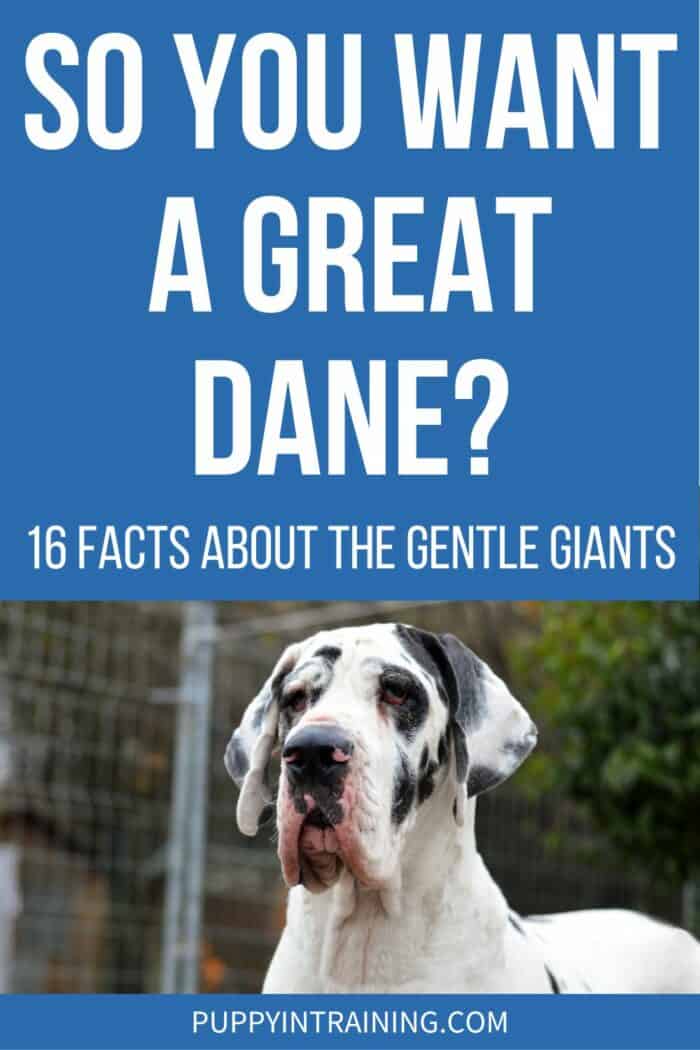
Top Picks For Our Puppies
- BEST PUPPY TOY
We Like: Calmeroos Puppy Toy w/ Heartbeat and Heat Packs – Perfect for new puppies. Helps ease anxiety in their new home. - BEST DOG CHEW
We Like: Mighty Paw Naturals Bully Sticks – All of our puppies love to bite, nip, and chew. We love using Bully Sticks to help divert these unwanted behaviors. - BEST DOG TREATS
We Like: Crazy Dog Train-Me Treats – We use these as our high-value treats for our guide dog puppies. - BEST FRESH DOG FOOD
We Like: The Farmer’s Dog – A couple months ago we started feeding Raven fresh dog food and she loves it! Get 50% off your first order of The Farmer’s Dog.
Check out more of our favorites on our New Puppy Checklist.

